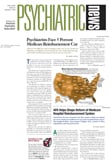The concept of “assisted living” is becoming increasingly popular in the United States. It is touted as a way for older people who can no longer live alone to retain their autonomy, privacy, and quality of life in a personalized environment. At least one million Americans are now residing in assisted-living facilities, and probably even more will do so as the American population ages.
However, assisted living hardly appears to be a utopian arrangement, at least as far as mental health is concerned. A large number of older persons living in assisted-living facilities are sad or have depression, a new study has found.
The study was headed by Lea Watson, M.D., a geriatric psychiatry fellow at the Duke University Medical Center in Durham, N.C. The results appeared in the October American Journal of Geriatric Psychiatry.
The study sample of Watson and her coworkers consisted of some 2,000 older individuals (half of them age 85 years or older) living in 193 assisted-living facilities in four states—Florida, Maryland, New Jersey, and North Carolina. The researchers used various instruments to assess the mental and physical health of their subjects, notably the Cornell Scale for Depression in Dementia. The instrument has also been validated in populations without dementia and is commonly used in research settings. It is a 19-item assessment based on patient and caretaker information. The scale includes questions about mood, behavior, physical signs, and idea disturbances. Each item is scored on a three-point scale, yielding a possible total score of 38, with higher scores indicating greater severity of depression. A score of 7 or more has been shown in many studies to indicate clinically significant depression.
Thirteen percent of all the subjects had a score greater than 7 on this scale, Watson and her coworkers found, indicating that they were clinically depressed. Moreover, at least a quarter of all subjects displayed symptoms of depression, such as sadness, tearfulness, worrying, or irritability, even if they did not meet all of the criteria for clinical depression. At the same time, only 18 percent of the group determined to be clinically depressed were receiving an antidepressant. When the researchers focused on subjects with the most severe depression, that is, those with a score of more than 12 on the Cornell scale, just 38 percent were receiving antidepressants.
The results have implications for clinical psychiatrists, Watson told Psychiatric News. “We need to be routinely screening for depression in these settings, especially as assisted-living facilities, unlike nursing homes, currently have no mandated oversight with regard to screening and treatment of depression or other mental disorders.”
The study also challenges a common belief that older patients with multiple physical problems can be expected to be depressed, Watson said.
“What our study showed was quite the contrary,” she explained, “which is even when you control for all the medical conditions, or all of the functional limitations, depression in and of itself was an independent risk factor for poor outcome. So it is not true to say that patients should be depressed with medical illnesses. In fact, most patients with many medical illnesses are not depressed.”
When Psychiatric News asked Watson whether psychiatrists around the United States are undertaking any special programs to help depressed persons in assisted-living facilities, she replied: “There are several groups that have made commitments to [addressing] dementia in these settings, but to my knowledge no group has made efforts to target depression, and that will be the next phase of my work.”
The study was funded by the Robert Wood Johnson Clinical Scholars Program and the National Institute on Aging.
Am J Geriatr Psychiatry 2003 11 534
